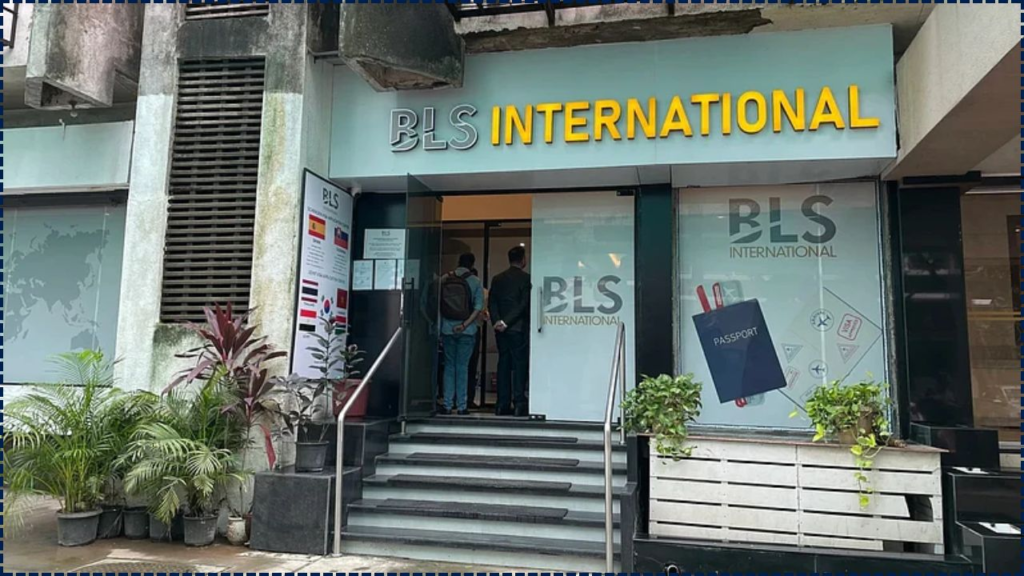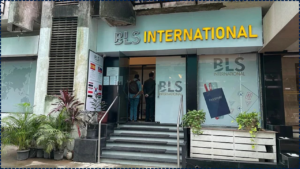
The Ministry of External Affairs (MEA) has imposed a two-year ban on BLS International Services Ltd, one of India’s largest outsourcing firms for visa and passport services. The order prevents the company from bidding on any future tenders for Indian missions and posts abroad during this period.
The government has clarified that existing contracts remain valid, meaning there will be no immediate disruption for applicants using BLS centres to process their visas or passports.
Table of Contents
Why the Ban Was Imposed
The decision follows months of scrutiny over service quality, operational complaints, and legal disputes involving the company. Officials said the ban was issued after a “comprehensive review” of documented concerns. The order applies only to new tenders; no current service centres will be shut down as a direct result of the ban.
Although detailed reasons were not made public, the ministry is understood to have taken note of repeated complaints from applicants across several countries, as well as legal cases pending against the company.
A senior government official, speaking on background, said: “This is a matter of accountability. The integrity of consular services must be maintained at the highest standard.”
BLS International has responded by stating that it will continue its existing operations without interruption and is exploring legal options to challenge the decision.
Short-Term Impact: Services Continue as Usual
For millions of applicants in countries where BLS operates — including the UAE, the UK, Canada, and parts of Europe and Asia — visa and passport processing will not stop. All existing contracts with Indian missions abroad remain in place until they expire.
Embassies and consulates have reassured the public that scheduled appointments, application procedures, and processing timelines remain unchanged for now.
A spokesperson for the MEA said: “Applicants should not expect disruptions in their immediate travel or document processing plans.”
Medium-Term Impact: Transition Risks Ahead
While the short-term outlook is stable, medium-term changes are likely as contracts begin to expire over the next two years. Since BLS is barred from competing for new tenders, other outsourcing companies may step in to provide services.
This transition may lead to:
- Shifts in service centre locations
- Adjustments in application procedures or platforms
- Potential delays during the changeover period
- Revised fees or service terms
Analysts say the real impact will be felt gradually, particularly in countries where contracts are set to expire soon. A poorly managed transition could lead to temporary disruptions in consular services.
Company Response and Business Implications
BLS International has called the ban “unexpected” and said it does not foresee immediate financial distress, as existing contracts continue to generate revenue. The company’s overseas business is geographically diversified, and it also provides non-MEA services in several markets.
However, the company’s reputation has been affected, and its future growth in the Indian government segment may slow during the ban period. Market observers note that exclusion from new tenders for two years could weaken its position against competitors.
A legal challenge remains possible, but experts say such cases can take months or even years to resolve.
Outsourcing Consular Services: The Bigger Picture
The outsourcing of visa and passport services is a critical part of modern consular operations. Governments rely on private companies to manage administrative tasks, allowing diplomats to focus on policy and citizen support. Outsourcing improves efficiency and handles the high volume of global mobility.
However, outsourcing also raises questions of accountability, service quality, and data security. When contractors fail to meet expectations, the consequences are felt directly by ordinary travellers.
Professor Anil Mehta, an international relations expert, said: “Outsourcing helps governments scale their consular work, but it demands strong regulation, oversight, and responsiveness. When trust is eroded, governments must act.”
Other Providers May Step In
India’s overseas consular network already uses multiple service providers, not just BLS. In several countries, visa and passport services are managed by other companies. The ban may open opportunities for competitors to expand their footprint.
Officials have hinted that new tenders will be floated in several countries in 2026, creating room for a transition period well before the current contracts expire.
Such a phased handover is expected to minimise service disruptions.
Potential Impact on Travellers
For ordinary travellers, the most immediate effect of any outsourcing change is usually procedural rather than structural. Applicants may have to adapt to:
- New online portals for form submission
- Different appointment systems
- Modified service fees
- Updated tracking tools
Travellers are advised to closely monitor embassy announcements, as missions typically issue public notices well in advance of any provider switch.
Strategic Setback for BLS International
For BLS International, the ban is a significant strategic setback. The company has worked with India’s foreign ministry for over a decade and has been a prominent player in the visa outsourcing market.
While it has diversified internationally, being excluded from future MEA tenders limits its role in the Indian government segment, which has historically been a key part of its brand identity.
Business analysts say the company may intensify its focus on non-Indian contracts, expand its digital service portfolio, or pursue partnerships in other regions to compensate for the loss.
Trust and Transparency at the Core
The MEA’s decision also highlights growing concerns about trust, accountability, and transparency in public-private partnerships related to sensitive functions like identity management and immigration.
Unlike commercial outsourcing, consular outsourcing involves handling personal data, including biometrics, passports, and identification documents. Governments are therefore held to high standards in ensuring their contractors meet security and service benchmarks.
By issuing a ban, the MEA is signalling that service providers must adhere strictly to standards, or risk losing future business.
A Shift in the Visa Outsourcing Landscape
Industry experts believe this move could reshape the competitive landscape of the visa outsourcing sector. India is one of the largest visa-issuing countries in the world. Any shift in its outsourcing partners can influence pricing, service quality, and innovation in the industry.
In the long run, the government may also consider expanding digital consular services, such as e-visas, to reduce reliance on physical service centres.
What Applicants Should Do
- Rely on official embassy websites for updates.
- Keep copies of receipts and tracking numbers for all applications.
- Be cautious of scams during transition periods, as fraudulent agencies sometimes exploit confusion.
- Allow extra time for processing during provider handovers.
- Seek official grievance channels if service quality declines.
Conclusion
The MEA’s two-year ban on BLS International marks a turning point in India’s approach to outsourcing consular services. Although no immediate disruption is expected, the decision sets the stage for gradual but significant changes in how millions of applicants interact with visa and passport centres abroad.
Travellers should stay alert to updates from Indian missions, while the government faces the dual task of ensuring service continuity and raising accountability in a critical segment of public service delivery.













